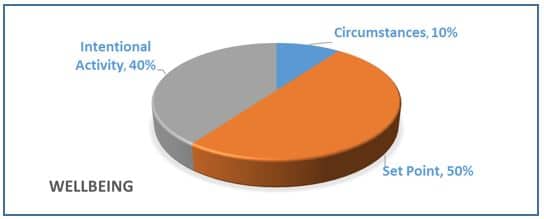Relationships will make you happy…?
SURPRISE!!
Your circumstances in life don’t make much difference to your wellbeing ………
Whether you are in a great relationship, rich, in a successful job, unemployed or disabled, does not have a huge impact on your underlying happiness. By and large your circumstances, even your upbringing, have only a small effect on your wellbeing.
This is the surprising conclusion of successive studies* – we tend to assume that our happiness must depend on our circumstances – our loved ones, where we live, our work etc, but these things have less effect than we think.
But surely relationships matter?
Yes — the biggest circumstance in life is probably who we are with – right? But there are big upsides and downsides to our relationships, they can be incredibly fulfilling yet we always risk having our hearts broken. It works both ways.
Family Here we can enjoy our closest relationships and can simply be ourselves. Unsurprisingly when these relationships go wrong the effects are often severe. So for example* a child whose parents split up is more likely to suffer disadvantages including possible depression and divorce themselves. (But don’t worry, if that happened with your parents, it happened with mine — there are lots of ways we can offset family circumstances and even be stronger because of them).
Work Work related stress is a significant factor for many people but the interesting point is that good relationships at work contribute more to job satisfaction than high pay*.
What things really affect my happiness?
In fact the greatest influence on our wellbeing in life is our set-point* — which we inherit. Some of us are born pessimists or worriers, others are naturally easy going or optimistic, still others are born determined or resilient etc. Our set point accounts for 50% of our wellbeing. We can do things to change this but we will tend to be drawn back to our set-point. It is important to know yourself — what type of person YOU tend to be.
Our circumstances on the other hand, things that happen to us including relationships, influence our wellbeing by only around 10%. That is surprising enough, but the startling conclusion of this research is that 40% of our wellbeing is determined by our intentional-activity – ie what are you going to DO about it?
So how can we be happy?
Well you can’t change your family (usually); changing your employment is possible but can be difficult. These are circumstances. Like how much money we have in the bank or whether we are seriously ill or have recently won the lottery, we can’t change these but we do tend to over-emphasise them in our mind; While we are thinking about them, they always seem more important than they actually are.
Intentional activity is different. We each have a personal responsibility to contribute to our own wellbeing, and one well-proven way to do this is by what we decide to do.
“If we can get the motivation to engage in positive, meaningful intentional activities, circumstances associated with our health, money, and even upbringing, have a surprisingly small impact on wellbeing”, Ann Morisey
There are many kinds of intentional activity such as pursuing a sport or pastime or socialising. But it is when these are directed toward others, through a community group that we get the greatest benefits in terms of seeing the good effects of our work on others, and occasionally even accepting help ourselves (which can be the hardest part!).
“Community” is not just the people down my street or people I meet on the internet. Belonging to a community means having regard for each other and engaging in some shared activity– this could be as simple as coming together for a charitable cause or to attend church, or even for a BBQ! There are lots of ways we become happier people by contributing to a community. We are helped by others and we are helped by helping others.
“Individuals with robust and diverse networks lead healthier lives…. have stronger immune systems…. recover more quickly from trauma” Alison Glichrist
Lastly — back to relationships
We can bring relationships into our intentional activity. That requires effort. It means thinking what we can do for people around us, expressing care, saying things that are perhaps uncomfortable to say. By doing so we can start to change relationships from something that just happen to us (circumstances), to something we do.
It’s strange but engaging in acts of kindness help us not to worry about ourselves. When Jesus said “If you try to save your life, you will lose it. But if you give it up for me, you will surely find it”, (Matthew 10.39), he wasn’t trying to say something complicated or puzzling.
Also in this series:
- Buying Stuff Will Make You Happy …?
- Going to Church Will Make You Happy…?
- Infographic: How to be Happy
*Resources: UN World Happiness Report, by The Earth Institute; Bothered and Bewildered by Ann Morisy; The Well Connected Community by Alison Gilchrist






[…] you enjoyed this post try reading Do Relationships Make Us Happy? The 7 most important words in a marriage are from a sermon by Brian Buhler, senior pastor at […]
Nice. May I have permission to print it for our women’s circle?
Of course please go
right ahead. The blog is part of a series appearing on https://7minutes.net
i find the whole article on relationships and happiness to be really pertinent at this point in my life, i am new to the church and still feeling my way around, but since joining i have attended many activities involving other church exercise classes or functions, and i have thrown myself in them wholeheartedly. i can honestly say, this last 3 months has totally changed my life, i think not about my life and illness and aging in general, but more about getting more people like myself involved, so that they can feel my sense of well being for themselves,… Read more »
That sounds great Marie! I think what you are describing is very much what is referred to as “intentional activity”, and sounds like you are already reaping benefit 🙂
None of them, work, skills, pay, whoa! wait! Pay???
Do you think your pay makes you happy — really? When you get a pay rise or bonus, sure you feel happy, for a short time. Then you get used to it — it wears off — and you need another one. Try my blog on buying stuff versus wellbeing — https://7minutes.net/blog/buying-stuff-will-make-you-happy/
Great article! Understanding ones true identity improves relationships and other key areas.
I appreciate that La Vonne especially having seen your background and knowledge in life coaching!
Great perspective Chris !
I appreciate your talking the time to read and comment 🙂
Do you think your pay makes you happy — really? When you get a pay rise or bonus, sure you feel happy, for a short time. Then you get used to it — it wears off — and you need another one. Try my blog on buying stuff versus wellbeing — https://7minutes.net/blog/buying-stuff-will-make-you-happy/
Suprising outcomes but in my opinion feeling more in control of our life gives us satisfaction and makes us feel happier instantly!
Interesting Agnieszka Feeling more in control is different to intentional activity I think since the latter is about engaging in actions especially within our communities. However I think there is an overlap between this and what you call “feeling in control” — thanks for your comment!
Isn’t the essence of the Christian message that God can reset our “set point”, which is surely part of what it means to be born again, and can also change at the same time and throughout our lives our “intentional activity”?
Really good question. I certainly think we are changed — reconfigured from the inside out by knowing God. And yes that happens as part of Christian life experience. So I can stop doing things I shouldn’t and start doing things I should and my perspective on events, people and problems will change. But does that mean for example that a “born worrier” will stop worrying through being a Christian? I actually think this “set point” is part of our God given personality and on the whole this is left intact by God. So I do learn to take my worries… Read more »
Really good question. I certainly think we are changed — reconfigured from the inside out by knowing God. And yes that happens as part of Christian life experience. So I can stop doing things I shouldn’t and start doing things I should and my perspective on events, people and problems will change. But does that mean for example that a “born worrier” will stop worrying through being a Christian? I actually think this “set point” is part of our God given personality and on the whole this is left intact by God. So I do learn to take my worries… Read more »
Great post Chris Goswami. Do you find this to be true in your life ?
i find the whole article on relationships and happiness to be really pertinent at this point in my life, i am new to the church and still feeling my way around, but since joining i have attended many activities involving other church exercise classes or functions, and i have thrown myself in them wholeheartedly. i can honestly say, this last 3 months has totally changed my life, i think not about my life and illness and aging in general, but more about getting more people like myself involved, so that they can feel my sense of well being for themselves,… Read more »
That sounds great Marie! I think what you are describing is very much what is referred to as “intentional activity”, and sounds like you are already reaping benefit 🙂
Yes — I have found that in my role as a (trainee) minister I have been fortunate enough to spend time in communities with varying needs — sometimes the need for a listener, sometimes the need to run an activity, or sometimes there is the need to celebrate (eg the birth of a child). I can say that playing a small part in their day to day lives (“intentional activity”) is immensely gratifying. Hope that answers the question .,…
Yes — I have found that in my role as a (trainee) minister I have been fortunate enough to spend time in communities with varying needs — sometimes the need for a listener, sometimes the need to run an activity, or sometimes there is the need to celebrate (eg the birth of a child). I can say that playing a small part in their day to day lives (“intentional activity”) is immensely gratifying. Hope that answers the question .,…